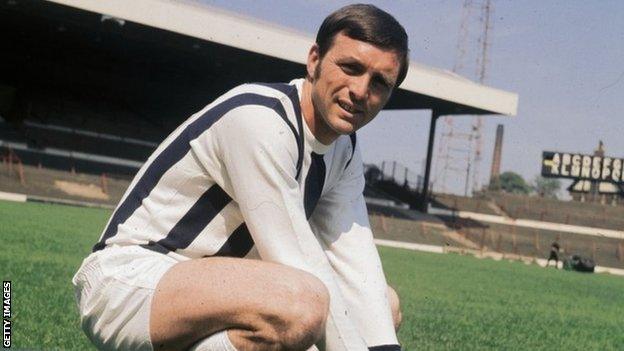PFA sets up neurodegenerative care department for ex-players, with Dawn Astle as project lead
- Published

Former England international Astle developed dementia and died in 2002 at the age of 59
A dedicated care department for former players living with neurodegenerative disease (NDD) has been set up by the Professional Footballers' Association.
Campaigner Dawn Astle, daughter of former England and West Brom striker Jeff Astle who died in 2012, will be the project lead for NDD in football.
A neuropathologist said he died of a brain condition normally linked to boxers and caused by heading footballs.
The PFA says a new head of former player care will lead the department.
Rachel Walden, whose father Rod Taylor was diagnosed with an NDD after his death in 2018, will oversee an extended family support advisors' team.
Former England captain Dave Watson's wife Penny will act formally as an independent consultant and she believes his neurodegenerative disease was most likely brought on by head injuries and repeated heading of the ball.
On Wednesday, Wycombe midfielder Matt Bloomfield retired on medical grounds after the impact of a serious concussion, when a free-kick hit him in the back of his head against Exeter in August.
New research last August showed defenders are more likely to have dementia in later life compared with other playing positions in football.
In 2019, a study by Professor Willie Stewart found that former footballers were about three and a half times more likely to die of neurodegenerative brain disease than the general population.
In 2015, Astle's family launched the Jeff Astle Foundation,, external which promotes care of others affected by the condition, as well as education about it and research into it.
Dawn Astle described the PFA's move as "significant step forward", adding: "I will always continue to support former players and their families living with dementia now, but a key focus of this new role will be to strengthen protections for current players and future generations.
"I will be working with football's stakeholders to urgently improve players' knowledge about the information they need to make informed decisions about their brain health."
PFA chief executive Maheta Molango added: "The first formal meeting I had [in the role] was with Dawn and Rachel. These were tough conversations, and I understand that families have felt let down.
"The creation of a new, dedicated department is hugely important, but we are acutely aware that this is just a first step.
"We are determined to take responsibility internally, but also to ensure that we advocate on behalf of members for a co-ordinated, football-wide approach on this issue."
Ex-Manchester United and England midfielder Nobby Stiles died in October 2020 aged 78 and a post-mortem found his brain was affected by a dementia believed to be caused by repeated blows.
On Tuesday,, external Blackburn fans launched a fundraising campaign to help with the £200,000 cost of care for the club's former midfielder and coach Tony Parkes, who suffers from dementia.
John Stiles, son of Nobby, said: "If the long-term healthcare and residential costs for suffering players are still not included, then it sounds like bluster and it's merely formalising what the PFA have already been doing for the last 18 months.
"Tony Parkes' family, and other families, still won't be getting help for long term care costs so the disgrace continues."
New guidelines issued last July said professional footballers in England are to be limited to 10 "higher force headers" a week in training from the 2021-22 season.

Our coverage of your Premier League club is bigger and better than ever before - follow your team and sign up for notifications in the BBC Sport app to make sure you never miss a moment
